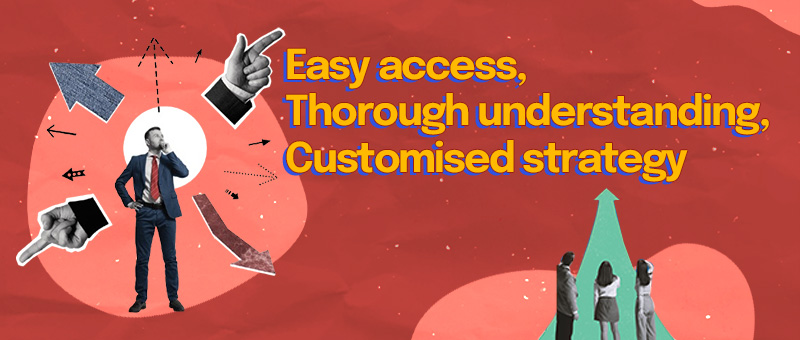Summary:
You know content is the key to staying on top of your customers’ minds. You are aware that it’s the secret to standing out in a crowded market. But how do you go about it? Whom do you assign this crucial aspect of your business? Should you go all in and create your own content team from scratch? Or should you seek out an agency to take care of your content?
These are some tough questions, and this article is here to help you find the answers.

Of all the dilemmas that come with managing a brand, few are as consequential as choosing between an in-house content team and an agency.
Let’s say everything else is in place. You have a great product or service with a unique value proposition that your customers can’t seem to get tired of. You know exactly what your brand stands for and where it’s headed in the next few years. Even the brand story and identity are clear in your head.
But who is going to tell this to the people who should hear this? Your own in-house content army or an agency who knows nothing about you right now? It’s confusing, to say the least.
The fact is, each of the two ways can bring great value to your company. It’s more about what will best suit your company right now, and finding that out depends on factors like your company’s goals, resources, and expertise needs.
Let’s suppose you have the option of adding eggs or salmon to your diet. (Or if you are a vegan or vegetarian, think of peanut butter and bananas instead.) Both options can give you valuable nutrients. But if you have to go with one, which one will you choose?
The answer depends on your preferences and dietary needs, right? Well, choosing between an in-house team and an agency is no different. What you should eventually choose largely depends on what your brand’s needs and preferences are. And to understand these needs, you must answer these four questions.
4 Questions to Answer Before You Make A Decision

1. What’s your budget?
How much can your company spend? Is it a recurring requirement? If so, how much can you spare every month or year?
We know they sound obvious, but they are important.
Knowing these figures is essential because cost is a defining factor that sets agencies and in-house teams apart.
2. How much content do you need?
Does your company plan to churn out tons of articles, newsletters, social media posts, and other forms of content within the next few months? Or does it rather want a slower, steady flow of content?
Answering this question can immensely help you get closer to your decision, since in-house teams and agencies starkly differ on the volume of content they can conveniently produce.
3. Do you need specialized skill sets?
Of course, you need specialized skills like writing and SEO to work on any form of content. But the real question is, how many diverse skills do you need?
If you are looking for just one content format, say blog posts, you may need just one or two skills—mainly writing and SEO—for which an internal team is enough. But if your needs extend to multiple skills like multimedia, web design, and beyond, you might want an external team of diverse professionals who can bring their experience to your brand.
4. Is scalability a factor?
Do you believe in going with the flow without thinking about the future? Well, you’d better not do that when choosing between an in-house team and agency. Because if, in the future, you want to scale your content efforts up and down, the two options offer very different levels of flexibility.
With an in-house team, ramping up content volume requires a lot of time, money, and effort. However, an agency can easily adjust according to your company’s varying needs without such commitments from your end. So, make sure to factor in your company’s scalability needs before making a decision.
Once you have the answers to these questions, you are all set to solve the puzzling problem at hand—deciding between in-house teams and content marketing agencies. And to help you do that, let’s look at the good and challenging aspects of both options, starting with in-house teams.
Advantages of an In-House Content Team
Think of an in-house team as a personal kitchen. It gives you immediate access to chefs as well as complete control over the ingredients and the dishes. And the best part? It’s located right inside your home.
An in-house team comes with some very similar advantages:

1. It knows your brand—in and out:
What’s a great thing about having a personal chef? They understand your taste. They know what you like and dislike, how many teaspoons of sugar you want in your tea, if you take your coffee neat, and how spicy you like your curry. Put simply, they get you.
The same goes for an in-house team: they know your brand. You don’t need to brief them on your brand’s mission, values, company culture, and tone of voice since they are already part of it all. This makes it much easier to work with them in the long run.
2. It’s in the house—literally:
Imagine you are sitting at your desk, going through the details of an ongoing project your content team is working on. Suddenly, you remember something—an interesting idea or an important change. So you just get up, walk up to your marketing team, and tell them about it. Sounds pretty convenient, right?
Well, that’s because an in-house team is precisely what it promises to be: in-house. It makes it possible to communicate and collaborate with your team members whenever you want since they are always a desk away (whether they like it or not).
3. It’s tailormade for your brand:
This might as well be the biggest benefit of an in-house team: it’s in your control. Right from deciding who joins your team to how your team operates—everything is under your command.
You can build and modify custom processes, define and redefine workflows, and even increase or decrease content production according to changing needs. The result? When managed right, an in-house team perfectly fits your brand—pretty much like a tailor-made suit.
Challenges of an In-House Content Team
As convenient, collaborative, and customizable an in-house team may be, setting it up may not be feasible for your company—for all the valid reasons.

1. It comes with a long list of costs:
A personalized kitchen and personal chef come with hefty costs, and so does an in-house content team. Since the team members are employees, your company must have the budget for salaries and employee benefits like provident fund and insurance. Oh, and let’s not forget that you must also invest in employee training, office space, as well as marketing software and tools, such as Ahrefs, Surfer, Semrush, and the like.
Quick Tip:
The costs themselves may not always be a problem—and can even be worth it—when the benefits of having a team align with your brand’s long-term goals and needs. It boils down to whether the return on investment (ROI) you seek outweighs the expense.
2. It lacks diversity:
Suppose you have a stellar in-house team for producing content. You have skilled writers who excel at writing blog posts, articles, and other formats, and a promising SEO expert who really knows a lot about how search engines work. But there is a catch: that’s all you have.
What if you want to execute a multimedia strategy that involves visuals and videos? Sure, you can add a designer and a video editor to your team. But when the workload suddenly increases, say for a specific project, your team may still not be able to handle everything and will ultimately have to outsource. After all, there’s only so much an in-house team can do, and you can’t keep hiring people as and when projects demand.
Quick Tip:
You can have an internal team and still outsource for a specific project—it’s fine. In fact, it’s wiser and more efficient to outsource for one-off or temporary requirements rather than expand your internal team only to trim it down soon after.
3. It demands a lot of time and effort:
All said and done, building a content team from scratch is no small feat. Right from the initial onboarding and training to the point when you finally have a team, your company has to spend a lot of time, effort, and existing resources to put everything in place. For companies with limited capacity, such demands can stretch internal resources and may not be easy to pull off.
Quick Tip:
Since projects are usually deadline-driven, the most crucial factor here is time. So, ask this question: Can you afford to lose the time it takes to train a team from ground zero? The answer will tell you if you can afford building an internal team.
Advantages of Outsourcing to an Agency
If an in-house content team is a personal kitchen, a content marketing agency is a cloud kitchen. Just as a cloud kitchen specializes in efficiency and scalability, an agency can help you overcome all the limitations that come with an in-house team, along with some added benefits!

1. All the skills you need—at your service:
In-house content teams are often not equipped with diverse expertise, the same way even the most skilled chefs don’t know all types of cuisines. Enter an agency, and this problem of limited skills vanishes into thin air.
Unlike in-house teams that may be limited in their skillsets, an agency has its own army of professionals—from writers, copywriters, and SEO experts to graphic designers, video editors, and social media strategists. In other words, you get specialists who specialize in just what your company wants.
2. Simplified, customizable costs:
Remember the long list of expenses we discussed for in-house teams? The beauty of working with an agency is that they enable you to pay for what you want, when you want it, and for as long as you want it.
For starters, agencies charge according to requirements. So, whether you want to run a seasonal campaign, promote a new product, or enter a new market—the costs are based on your varying needs. Once the campaign is over and you want to cut back on costs, you can scale down right away. Simple as that.
3. Fast, efficient content production:
Picture that your company wants to launch a large-scale seasonal campaign. A lot of content is lined up—blog posts, graphics, videos, newsletters, a landing page, you name it. No matter how skilled your in-house team is, it can likely take several weeks to deliver everything and may even have to outsource parts of the campaign.
That’s where an agency wins the game. It can churn out and distribute content really fast without compromising on quality. A good agency can handle tight deadlines, turn in quick revisions, and deliver more in less time—all of which can otherwise feel stretched and strained with an in-house team.
4. Always equipped, always ready to deliver:
Have you ever heard a restaurant run out of sugar or a Domino’s outlet cancel your pizza order because their microwave stopped working? Such issues are rare because, as professional food providers, they are already prepared for such shortcomings. And it’s very precisely the same with agencies.
Since creating, optimizing, and tracking content are at the core of what agencies do, they are already equipped with the latest tools for SEO, content management, analytics, and more. So you can rest assured that your campaigns won’t be hampered because of some lack of the latest tools and resources.
Challenges of Outsourcing to an Agency
Despite all the convenience they bring, agencies offer a fair share of challenges that might seem a bit daunting.

1. It might take a while before action happens:
No matter how great an agency is, it doesn’t know your brand the way an in-house team does. So, each time you work with a new agency, you must tell them all about your company and its current goals before they start working on your brand.
For example, our onboarding process at Digital Juse begins with sending the client a brief document containing questions about the brand personality, audience demographics, project purpose, competitors, and loads of other things. We then get on calls with the client to understand the requirements better. Yes, this might feel like a lot of work. But this solid brief document creates the rock-solid foundation on which we build your brand.
Quick Tip:
While the onboarding process and time may differ across agencies, remember that those that bring good results are usually the ones that ask a lot of questions and get an in-depth understanding of your brand before getting to work.
2. Direct control takes a backseat:
If you like the idea of controlling everything end to end, working with an agency may seem a bit difficult, at least in the beginning. That’s because when an agency takes charge, you may not always have a direct say in day-to-day decisions.
However, this may not be a bad thing. Agencies bring their own varied experience to your brand, and they work best when left with their freedom and expertise. In fact, a good agency will also make you comfortable—not just by explaining the why behind every decision they make, but also by actively involving you in the process.
Quick Tip:
Look for agencies that are eager to collaborate with you in every step of their process. They will not only keep you in the loop by sending you regular updates but also take accountability for both growth and setbacks.
Time to Make the Call: In-House Team or Agency?
Both in-house teams and agencies can help you with content marketing, and the one that fits your bills, needs, and preferences is the one you should choose. And if you think that an agency is your way to go, look for the ones that are transparent about their processes, curious about your brand, and eager to communicate and collaborate.
At Digital Juse, we not only check all these boxes but also have deep expertise in helping brands grow—without ultra-lucrative guarantees, but with thoughtful strategies that actually work! So, hit us up via call, email, or message, and allow us to take your brand forward and upwards with ethical, people-first marketing.



